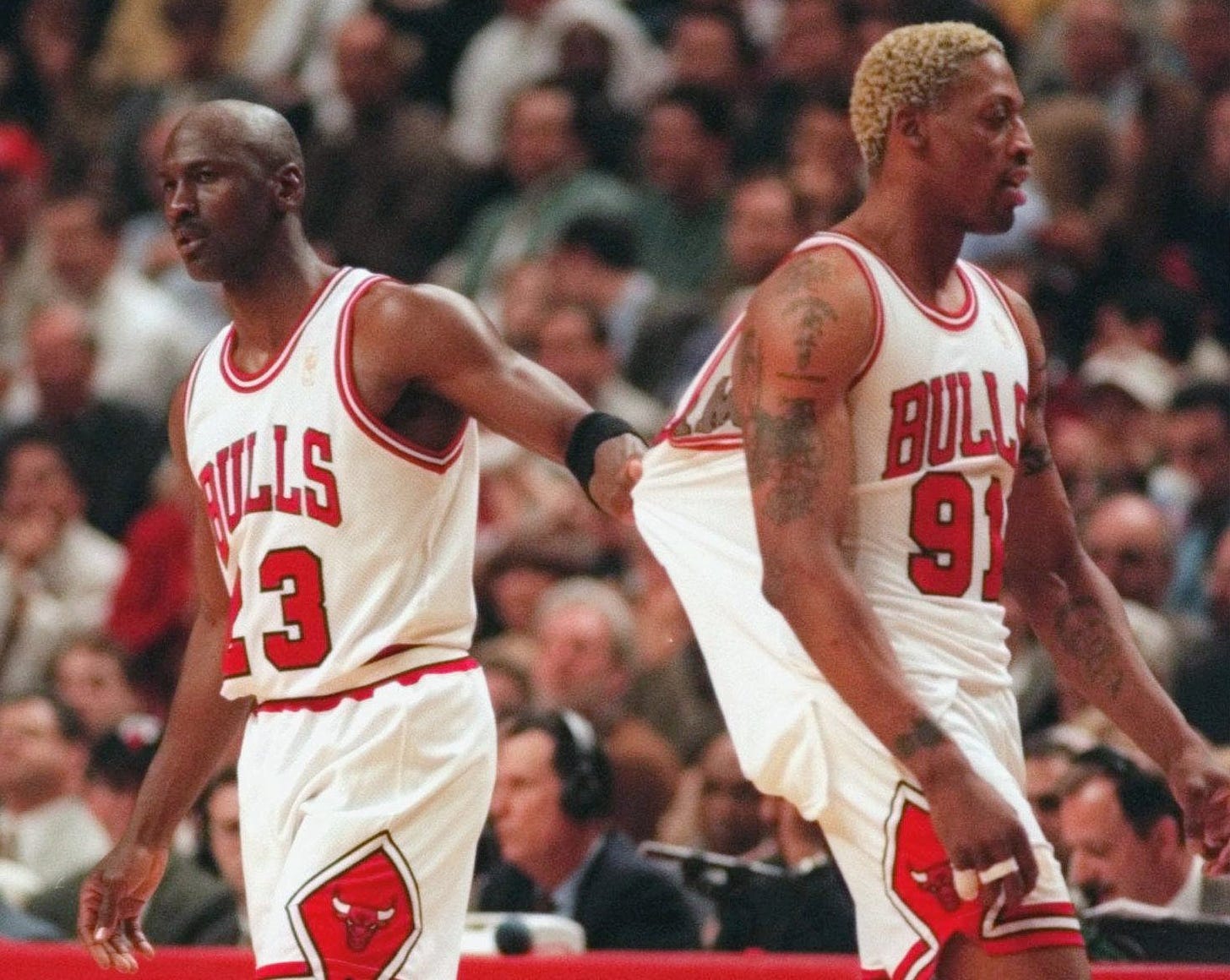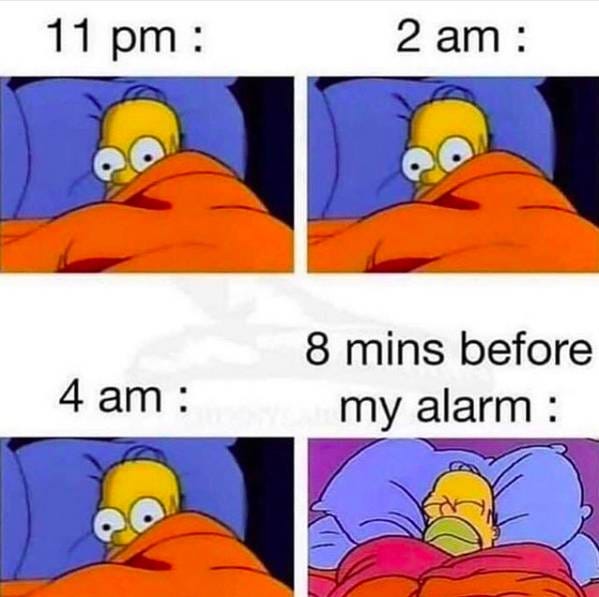Welcome to the MoneyNeverSleeps newsletter! Thanks to the 57 fans who signed up for the newsletter. If you’re reading this but haven’t subscribed, now’s the time to join!

And went hard all fall like the ball teams
Just so I can make it rain all spring
- ‘Forever’ Drake, Eminem, Kanye West
Anyone listening to the podcast in the last few weeks will know that I am a big fan of ‘The Last Dance’, the 10 part documentary following the 1998 Chicago Bulls team as they attempted to win a record 6th NBA title and a second three-peat, having won the titles in ‘91, ‘92, ‘93, and ‘96 and ‘97.
Whilst the obvious star of the show was Michael Jordan, the person I found the most interesting across the 10 episodes was Dennis Rodman.
(And no, it wasn’t just the tattoos, dyed hair and earrings that I found interesting….to anyone that doesn’t know me - I also have tattoos, dyed hair and an earring!).
We live in a world where the public stature of the founder/entrepreneur has never been higher and there is constant ‘hero-worshipping’ of entrepreneurs such as Elon Musk, Kanye West, Mark Zuckeberg, etc.
But, just as not all hereos wear capes, not all entrepreneurs are founders.
I hate the term ‘intrapreneurs’ but it is widely used term to descrbe members of a team that bring that entrepreneurial mindset to an organisation and drive real internal change.
I prefer the term ‘maverick’.
Why does this matter?
Michael Jordan is widely regarded as the greatest basketball player in the history of the sport. But, ‘The Last Dance’ paints a very interesting picture of that Chicago Bulls team. And this is most relevant in the story about a time, during the 1998 Playoffs, when Dennis Rodman requested vacation time to go to Las Vegas for 48 hours between 2 key games.
This crazy story ends 4 days later with Michael Jordan running from hotel to hotel in Las Vegas and dragging Rodman back to Chicago. Lost in the ridiculousness of this story is the fact that Rodman’s value that he brought to the team was so high that the team was always better with him in it, and the team and coach recognised this enough to allow him to operate under a different set of rules.
Sport has plenty of great examples where maverick players are allowed certain amounts of latitude to other players because of their skillset or what they can bring to the team. My own sporting hero growing up, Eric Cantona, embodies this.
But what about the mavericks in a corporate environment? The people who drive innovation and new ways of thinking in an organisation, but don’t always fit the mold of ‘how we do things around here’.
Where are their stories?
Apple is the story of Steve Jobs but less is mentioned about Jony Ive. Very few will have heard the story of Richard Drew (see ‘Left Field’ below).
They are the ones who are constantly pushing the boundaries of what is possible, constantly asking the question ‘why’…or more importantly ‘why not’?
When you look at your team, your staff, what do you see?
Have you a maverick on your team?
Embrace your mavericks…because they can be the difference between good and great.
Tell me why I’m wrong…
- Eoin
Left Field
How do I describe ‘Left Field’? It’s a place to put the content (newsletters/articles, etc) that we have amassed over recent weeks or previous years that really make us think or change our thinking on a particular topic. All the content will offer an alternative view of some topic in financial services, technology or sport (or a combination of all three!)
The Man Who Invented Scotch Tape
In the spirit of mavericks, this week’s article is the little known story of Richard Drew, the man who invented a product found in over 90% of US homes, and which has been to the moon (as insulation on a lunar lander), has been featured on Saturday Night Live, and has been immortalized in fine art.
In the 1920’s, a college dropout, Richard Drew applied for a menial job with 3M by referencing his experience with farm work and tractor driving!
After 2 years of testing various grains of sandpaper, a chance meeting at a garage led Richard on a journey to creating a superior less aggressive tape. The lack of experience or engineering know-how didn’t stop Richard, and he also had to find creative ways to create his product without the direct support of his superiors.
Not only did Richard Drew pioneer Scotch transparent tape and masking tape, but he ended up revolutionizing the way that his company, 3M, treated creative people.
(FYI - 3M generated $32bn in revenue in 2019).
Anyway, I won’t give away any more. Enjoy the article and feel free to get in touch to discuss more!
- Eoin
Can’t Sleep?

MoneyNeverSleeps podcast episode from this week:
Episode 94: Gene Murphy, co-founder of Startup Boost joins our first video edition of the podcast to talk about his earliest entreprenurial experiences, the overnight evolution of Startup Boost to the virtual world, the art of mentorship and his short-lived reign as Ireland's number one male Health and Beauty reporter.
Audio version on Transistor, Apple and Spotify
Podcast Recommendation: Check out Business Casual from the MorningBrew team and hosted by the always excellent Kinsey Grant.
Book Recommendation: It’s About Damn Time by Arlan Hamilton: How to Turn Being Underestimated Into Your Greatest Advantage - the founder of Backstage Capital shares her one-of-a-kind journey into venture capital. Her determination to never give up is inspiring to say the least!
Article/Newsletter Recommendation: if you haven’t heard of him already, check out the excellent writing of Nathan Tankus, where he covers the play by play of the current pandemic-induced global depression and how policymakers should respond to it as well as assessing how they actually are responding
This newsletter has been written by Eoin Fitzgerald and Pete Townsend
Want more MoneyNeverSleeps?
Check out the MoneyNeverSleeps Podcast on Apple Podcasts, Spotify, all major podcast platforms, and on our MoneyNeverSleeps page on Transistor.



